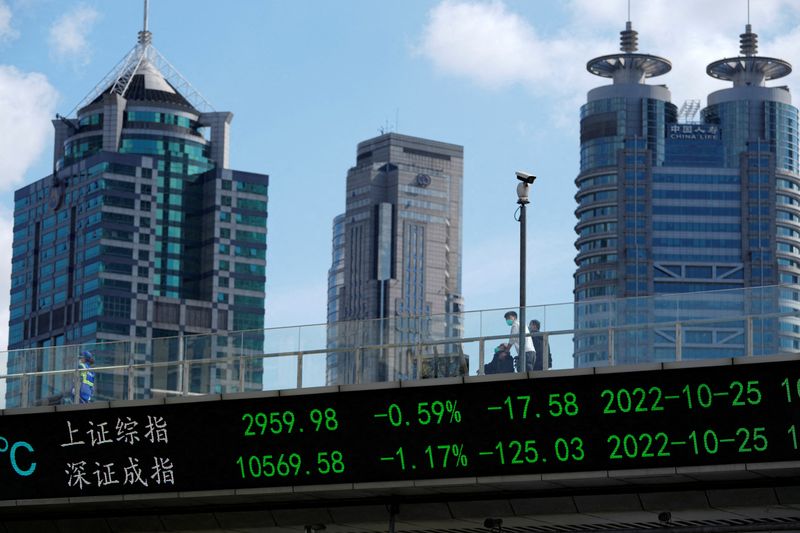By Summer Zhen and Rae Wee
HONG KONG/SINGAPORE (Reuters) - Investor negativity on China is showing signs of shifting as money managers stop or slow cuts to their exposure, even if they see a durable bullish tilt in the market or sentiment as distant.
After August, when foreigners dumped a record 90 billion yuan ($12.34 billion) in Chinese stocks, net selling has slowed to a more sedate 20 billion yuan in the month to date.
Economic data has also turned in positive surprises for the first time in months.
Investors at six large asset managers - Pictet, BNP Paribas (OTC:BNPQY) Asset Management, Janus Henderson, J.P. Morgan Asset Management, Invesco and RBC - told Reuters they have neither reduced nor added to their China weighting following recent measures to support the economy.
"While the overall picture is grim, bearishness around Chinese equities may have reached a local peak and we therefore are refraining from cutting our exposure," said Dong Chen, head of Asia macroeconomic research at Pictet Wealth Management.
China's blue-chip CSI 300 Index is down 4.5% this year and hit a 10-month low this week, but has steadied on support levels at around 3,700.
The Shanghai Composite Index is flat in September after a 5.2% slide in August, while the Hang Seng Index is also holding off fresh 2023 lows. It is down 9.5% this year. World stocks are up 12%.
On the economic front, industrial output and retail sales growth also beat forecasts in August.
"Market sentiment towards Chinese equities has slightly recovered following the July Politburo meeting," said Chi Lo, senior market strategist for Asia-Pacific at BNP Paribas Asset Management, as authorities pledged support for consumption and property.
"The supportive policy tone has been seen as mildly positive. Officials recognise the problems in the economy and are ready to step up support further, but still not at the cost of worsening China's structural imbalances."
WAIT AND SEE
The encouraging signs haven't moved managers into buying, or drawn global capital, but they are being noticed and many are taking a patient wait-and-see approach rather than deciding to pull more funds out.
"The problem at the moment is that portfolio managers' perceptions are in this painful transition phase -- they have suffered too many full storms on a recovery in Chinese equities, which are ultimately disappointing," said Alex Redman, chief equity strategist at CLSA.
"You go to a point where it's twice beaten and very shy."
To be sure, the country's beleaguered property sector, for one, remains a huge overhang, with major developers like Country Garden and Sino-Ocean teetering close to default.
And while deflationary pressures in China eased last month, a record-high youth unemployment rate, uncertainty over household income expectations and deepening U.S.-China tensions cloud the growth outlook of the economy.
"It's very difficult for our clients to trade short term and time the market," said Jasmine Duan, investment strategist at RBC Investment Services (Asia).
"The market is likely to have long-term upward momentum only when the economy stabilises, corporate earnings recover, and foreign investor sentiment toward China assets improves meaningfully."
SEEKING ALTERNATIVES
Others have meanwhile sought out opportunities in markets outside of China, but that trend is showing signs of ebbing. A rush of money into India, for example, slowed in August.
Sat Duhra, a portfolio manager at Janus Henderson, said his fund has "record-high" positions in Indonesia and India given their comparatively "stable" macroeconomics and political backdrop, among other things.
"China remains investible but the recent measures fall well short of investor expectations, they don't change anything in my view," he said, referring to the stimulus steps rolled out by Beijing to shore up its economy.
Patrick Garvin, product director of Asian and emerging markets equities at Invesco, is also sticking to his China position, but beginning to think about catalysts for gains.
"Although we have selectively added to existing holdings on weakness, we feel that we have enough of a tilt towards China and see no need to increase exposure given opportunities available elsewhere," he said.

"With attitudes towards China currently so weak, equities valuations could be quite sensitive to signs that corporate fundamentals are starting to improve."
($1 = 7.2910 Chinese yuan renminbi)